“情态动词 + have done”用法盘点
情态动词have_done

情态动词+have+done是历年高考的重点和难点之一,现将其用法总结归纳如下:一、must+have+done表示对过去事情的肯定推测,译成“一定做过某事”,该结构只用于肯定句.1. It must have rained last night, for the ground is wet. 昨晚一定下雨了,因为地面还是湿的2. You must have been mad to speak to the servant.你和仆人说话,一定是发疯了二、“can't+have+done”表示对过去事情的否定推测,译成“不可能做过某事”。
1. Mr. Smith can't have gone to Beijing, for I saw him in the library just now. 史密斯先生不可能去北京了,我刚才还在图书馆见过他。
2.Mary can't have stolen your money. She has gone home.玛丽不可能偷你的钱,她回家去了三、“can+have+done”表示对过去行为的怀疑,用于疑问句,译成“可能做过……吗?”。
1.There is no light in the room. Can they have gone out?屋里没有灯,他们可能出去了吗?2. There is nowhere to find them. Where can they have gone? 到处找不到他们,他们可能到什么地方去呢?四、could+have+done’是虚拟语气,表示对过去事情的假设,意思是本来能够做某事而没有做.He could have passed the exam, but he was too careless.本来他能通过考试,但他太粗心五、“may+have+done”表示对发生过的事情的推测,意思是“可能已经”或“也许已经”,用于肯定句中。
情态动词+have done用法

情态动词+have done (have been doing )一、教学目标情态动词+have done (have been doing ) 的用法二、生成问题情态动词+have done (have been doing ) 的用法有哪些?1、should(ought to)+have done (have been doing )表示“本来应该做而实际上没做”,其否定式表示“本来不该做却做了”,常含有责备的语气。
You should have been here five minutes ago.五分钟之前你就应该到这里了。
How I regretted the days when I had played and should have studied.我多么懊悔我本应该好好学习的日子都玩掉了。
We shouldn’t have been resting so long.我们真不该休息这么长时间。
2、could+have done表示“本来有能力做而实际上没有做”。
—We could have walked to the station, it was so near.这么近,我们完全能走着来车站。
—Yes. A taxi was not at all necessary.是呀,根本不必搭车的。
I could have won if I hadn’t fallen over.要不是摔倒,我准能赢。
3、needn’t+have done表示“本来不必做的事,实际上做过了”。
I got up early, but needn’t have done so, because I had nothing to do that morning.那天早上我起得很早,可我根本不必起这么早,因为我无事可做。
You needn’t have written such a long article. The teacher only asked for 300 words, and you have written 600 words.你没有必要写这么长的文章,老师只要求写300字,你写了600字。
情态动词加have done的用法
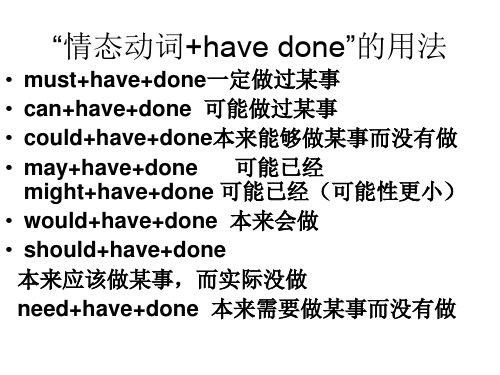
四、 “may+have+done”
• 表示对发生过的事情的推测,意思是“可 能已经”或“也许已经”,用于肯定句中。 • • • • —What has happened to George? —I don't know. He may have got lost. —乔治发生了什么事? ——我不知道,他可能迷路了。
一、 “must+have+done”
• 表示对过去事情的肯定推测,译成“一定 做过某事”,该结构只用于肯定句。 • 1. It must have rained last night, for the ground is wet. 昨晚一定下雨了,因为地面 还是湿的。
2. You must have been mad to speak to the servant. 你和仆人说话,一定是发疯了。
八、 “should+have+done”
• 意思是“本来应该做某事,而实际没做。” “shouldn‘t+have+done”表示本来不应该做某 事,而实际做了。含有指责对方或自责的含意。 • • 1. Tom, you are too lazy. The work should have been finished yesterday. 汤姆,你太懒惰了,这 项工作本来应该昨天就做完的。 • 2. Look, Tom is crying. I shouldn't have been so harsh on him. 看,汤姆哭了,我本来不应该对他 如此严厉。
九、 “ought to+have+done”
• 表示过去应该做而实际并没有做,译成 “理应做……”,往往表示遗憾。与 “should+have+done”用法基本一样。
情态动词+have done的构成及用法含译文
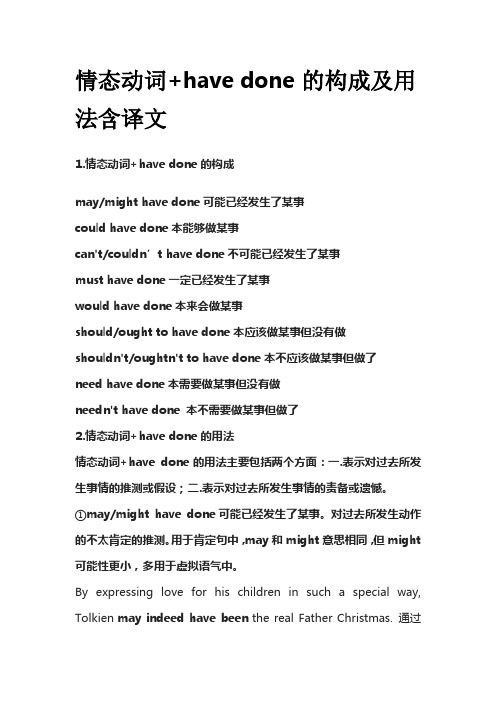
情态动词+have done的构成及用法含译文1.情态动词+have done的构成may/might have done可能已经发生了某事could have done本能够做某事can't/couldn’t have done不可能已经发生了某事must have done一定已经发生了某事would have done本来会做某事should/ought to have done本应该做某事但没有做shouldn't/oughtn't to have done本不应该做某事但做了need have done本需要做某事但没有做needn't have done 本不需要做某事但做了2.情态动词+have done的用法情态动词+have done的用法主要包括两个方面:一.表示对过去所发生事情的推测或假设;二.表示对过去所发生事情的责备或遗憾。
①may/might have done可能已经发生了某事。
对过去所发生动作的不太肯定的推测。
用于肯定句中,may和might意思相同,但might 可能性更小,多用于虚拟语气中。
By expressing love for his children in such a special way, Tolkien may indeed have been the real Father Christmas. 通过这种特别的方式表达对孩子们的爱,托尔金可能真的是真正的圣诞老人。
(新外研版必修二)You can check his office. He might have been there already. 你可以去他的办公室看看。
他可能已经到那儿了。
If he had been given more encouragement, he might have made greater progress. 如果给他更多的鼓励,他可能会取得更大的进步。
情态动词 + have done 用法一览表

Wouldlike/lovetohavedone
表示过去愿意做某事,但未做成。
IwouldlovetohavegonetothepartylastnightbutIhadtoworkextrahourstofinishareport.
情态动词+havedone用法一览表
情态动词+havedone
意义
例句
musthavedone
“想必、准是、一定作了某事”,否定式为can’t/couldn’thavedone
Must一般不用于否定句
Itmusthaverainedlastnight,fortheroadisquitemuddy.
Thelightswereoff.Theymusthavebeenasleep.
Youhadbetterhavestartedearlier.
Youhadbetternothavescoldedher.
Wouldratherhavedone
表示“宁愿当时做某事”,其否定式wouldrathernothavedone表达相反的含义,两者都表示“后悔”之意。
Iwouldratherhavetakenhisadvice.
Yououghttohavedonethisexercisemorecarefully.Shouldn’t/ou来自htnottohavedone
“本不应该做而做了某事”
Youshouldn’thavetoldherthetruth.
Needn’thavedone
表示“做了本来不必去做的事”。注意:didn’tneedtodo表示“没必要做并且实际上也没有做某事”。
情态动词+have done的用法

May/might +have done
表示对过去发生的动作或状态的 推测。 Eg:她那时可能是迷路了。要知 道,这是她第一次去那儿。 She may have lost her way.You know, it was her first time to get there.
Must + have done
这种结构只用于否定句,表示做 了不必要做的事情,意思是本可 不必 你本可以不必把这份报告重写一 遍的. e.g. You needn’t have rewritten the report again.
Should/ought to+have+p.p
用在肯定句中,表示过去应该做 (或值得做)而没有做的事情。 Eg:我本应该在期末考试的时候 好好准备的,但是我去旅行了. I should have prepared for the final exams,but I went to travel.
用于肯定句中,表示对过去事情 的肯定推测,意思是想必,一定, 准是--这位老兵在二战期间一定受了很 多苦。 e.g. The old soldier must have suffered a lot during the Second World War.
Need (not) +于否定句和疑问句 中,表示对过去某事情发生的可 能性的否定或质疑,意为“不可 能/会---的”和“可能/会---的 吗?” Eg: 他不可能学过日语,因为他 一句也不会说。 He can’t have studied Japanese because he can’t say a word.
情态动词+have done的用法
have done的用法总结

have done的用法总结
1. “Have done”可以表示过去已经完成的动作呀,就像“我已经写完作业了”,I have done my homework.
2. 当你想说“我已经吃过饭了”,这时候就可以用“have done”呀,I have eaten.
3. 岂不是很简单?你看“他已经去过北京了”,He has gone to Beijing. 这不就是“have done”的典型用法嘛!
4. 比如说“我们已经看过那部电影了”,We have seen that movie. 这就是在告诉别人这件事我们已经做完啦!
5. 还有啊,“她已经做完家务了”,She has done the household chores. 是不是很清楚呀?
6. 再想想“他们已经准备好了”,They have got ready. 这也是“have done”在发挥作用呢!
7. 哎呀,“我已经买了这本书”,I have bought this book. 多自然的表达呀!
8. 你看,“have done”的这些用法,是不是很实用呢?
总的来说,“have done”在各种情境中都能很准确地表达过去已经完成的事情,大家一定要掌握好呀!。
情态动词havedone的用法

• He need have hurried to the station. In that case, he wouldn't have missed the train.
• 他本来需要快点去车站,那样的话,他就不会误 了火车。
总结:
• Can/could have done“本来能够做而没做” • Can’t/couldn’t have done “不可能做了…” • May/might have done “可能做过…” • Must have done “肯定做了…” • Should have done “本来应该做…”(实际上没做)
• 表示对过去事情的推测,might与may意思相同, 但可能性更小。多用于虚拟语气结构中。
• 1. He might have given you more help, even though he was busy. (MET90)
• 他或许会多给你一些帮助,即使他很忙。 • 2. She might have achieved greater progress,
2. You must have been mad to speak to the servant. 你和仆人说话,一定是发疯了。
二、 “can't+have+done”
• 表示对过去事情的否定推测,译成“不可能做过 某事”。
• 1. Mr. Smith can‘t have gone to Beijing, for I saw him in the library just now.
• 1. Tom, you are too lazy. The work should have been finished yesterday.
情态动词 + have done 用法一览表

Ididn’tneedtocleanthewindows.Mybrotherdidit.
Hadbetterhavedone
用于事后的建议,含轻微责备的口吻,意为“要是当时做了某事就好了”,其否定式hadbetternothavedone表达相反的含义。
Youhadbetterhavestartedearlier.
Youhadbetternothavescoldedher.
Wouldratherhavedone
表示“宁愿当时做某事”,其否定式wouldrathernothavedone表达相反的含义,两者都表示“后悔”之意。
Iwouldratherhavetakenhisadvice.
It’stoolate.Ithinkhemayhavegonetobed.
Hemaynothavefinishedthework.
Shemighthavecaughtacold.
Should/oughttohavedone
“本应该做某事”,而实际上未做
Youshouldhavecometothemeetingearlier.
IsawMr.Wangjustnow.Hecouldn’thavegonetoBeijing.
May/mighthavedone
“也许、或许已经……”。一般只用于肯定句和否定句中(在否定句中表示“可能不”“或许不能”),may不用于疑问句,疑问句用can,could,或might。用might则表示语气更加不肯定。
Yououghttohavedonethisexercisemorecarefully.
情态动词+have done用法讲解

1. would have done用于虚拟语气,表示对过去可能发生的情 况进行推测,意为“本来会做” He would have helped me, but he was so busy. 2. need have done 表示“本来需要做某事,但事实上没有做” needn’t have done 则表示“本来不需要做某事,而实际上做了 We need have hurried to school. In that case, we wouldn’t have been late for the class. I needn’t have cooked so many cakes; only two children came.
3. should have done 表示“本来应该做某事,二十几上没有做” shouldn’t have done 则表示“本来不应该做某事,而实际上做 了”,含有职责对法或自责之意。 The essay should have been finished last week, but I forgot it. Tom is crying ; I shouldn’t have been so harsh on him. 4. might have done 表示使对过去情况把握性不大的推测,意为 “可能坐过…”或表示说话人因某人没做某事而不满,意为 “本应该做…” He might have won the race, if you had been backing him. 5. must have done 表示对过去情况的肯定推测,意为“一定做过 某事”,该结构只用于肯定句 It must have rained last night, for the ground is wet.
“情态动词havedone”用法总结
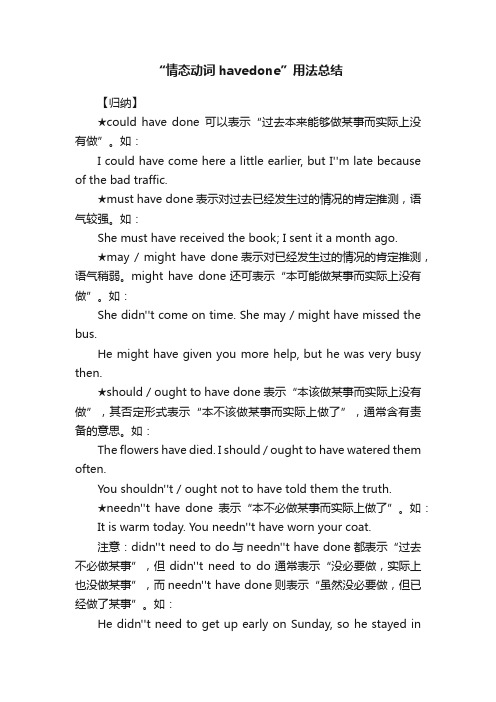
“情态动词havedone”用法总结【归纳】★could have done可以表示“过去本来能够做某事而实际上没有做”。
如:I could have come here a little earlier, but I''m late because of the bad traffic.★must have done表示对过去已经发生过的情况的肯定推测,语气较强。
如:She must have received the book; I sent it a month ago.★may / might have done表示对已经发生过的情况的肯定推测,语气稍弱。
might have done还可表示“本可能做某事而实际上没有做”。
如:She didn''t come on time. She may / might have missed the bus.He might have given you more help, but he was very busy then.★should / ought to have done表示“本该做某事而实际上没有做”,其否定形式表示“本不该做某事而实际上做了”,通常含有责备的意思。
如:The flowers have died. I should / ought to have watered them often.You shouldn''t / ought not to have told them the truth.★needn''t have done表示“本不必做某事而实际上做了”。
如:It is warm today. You needn''t have worn your coat.注意:didn''t need to do与needn''t have done都表示“过去不必做某事”,但didn''t need to do通常表示“没必要做,实际上也没做某事”,而needn''t have done则表示“虽然没必要做,但已经做了某事”。
情态动词+havedone用法总结

情态动词+ have done的用法总结一、“must+have+done”表示对过去事情的肯定推测,译成“一定做过某事”,该结构只用于肯定句。
1. It must have rained last night, for the ground is wet. 昨晚一定下雨了,因为地面还是湿的。
2. You must have been mad to speak to the servant. 你和仆人说话,一定是发疯了。
二、“can't+have+done”表示对过去事情的否定推测,译成“不可能做过某事”。
1. Mr. Smith can't have gone to Beijing, for I saw him in the library just now. 史密斯先生不可能去北京了,我刚才还在图书馆见过他。
2. Mary can't have stolen your money. She has gone home. 玛丽不可能偷你的钱,她回家去了。
三、“can+have+done”表示对过去行为的怀疑,用于疑问句,译成“可能做过……吗?”。
1. There is no light in the room. Can they have gone out? 屋里没有灯,他们可能出去了吗?2. There is nowhere to find them. Where can they have gone? 到处找不到他们,他们可能到什么地方去呢?四、“could+have+done”是虚拟语气,表示对过去事情的假设,意思是本来能够做某事而没有做。
He could have passed the exam, but he was too careless. 本来他能够通过考试,但是他太粗心。
五、“may+have+done”表示对发生过的事情的推测,意思是“可能已经”或“也许已经”,用于肯定句中。
情态动词+have-done的用法
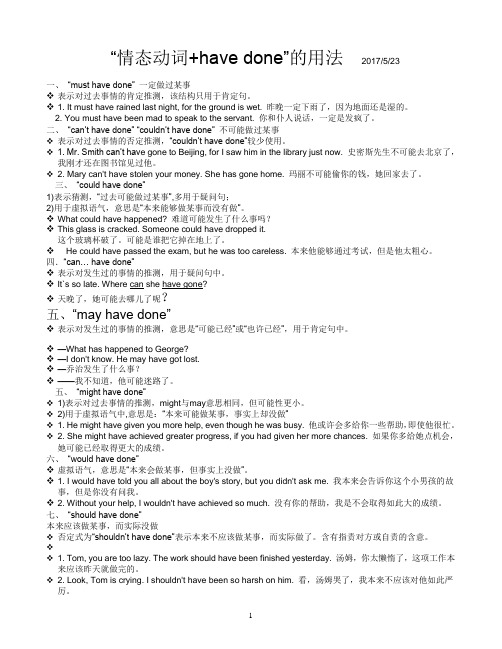
“情态动词+have done”的用法2017/5/23一、“must have done” 一定做过某事表示对过去事情的肯定推测,该结构只用于肯定句。
1. It must have rained last night, for the ground is wet. 昨晚一定下雨了,因为地面还是湿的。
2. You must have been mad to speak to the servant. 你和仆人说话,一定是发疯了。
二、“can’t have done” “couldn’t have done” 不可能做过某事表示对过去事情的否定推测,“couldn’t have done”较少使用。
1. Mr. Smith can’t have gone to Beijing, for I saw him in the library just now. 史密斯先生不可能去北京了,我刚才还在图书馆见过他。
2. Mary can't have stolen your money. She has gone home. 玛丽不可能偷你的钱,她回家去了。
三、“could have done”1)表示猜测,“过去可能做过某事”,多用于疑问句;2)用于虚拟语气,意思是“本来能够做某事而没有做”。
What could have happened? 难道可能发生了什么事吗?This glass is cracked. Someone could have dropped it.这个玻璃杯破了。
可能是谁把它掉在地上了。
He could have passed the exam, but he was too careless. 本来他能够通过考试,但是他太粗心。
四.“can… have done”表示对发生过的事情的推测,用于疑问句中。
It`s so late. Where can she have gone?天晚了,她可能去哪儿了呢?五、“may have done”表示对发生过的事情的推测,意思是“可能已经”或“也许已经”,用于肯定句中。
情态动词+have done
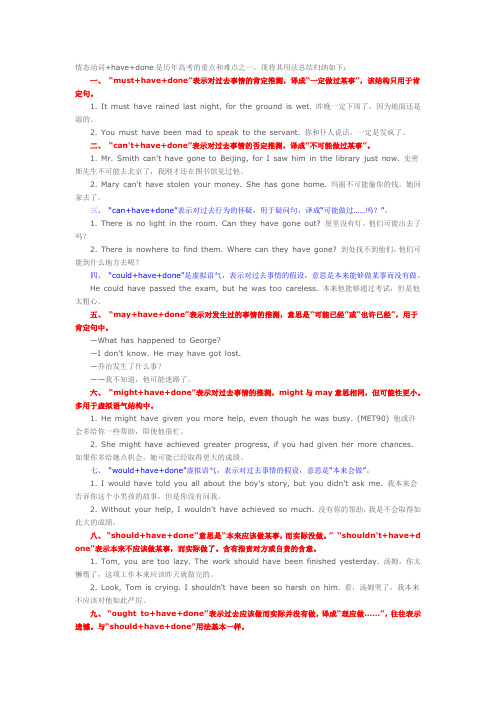
情态动词+have+done是历年高考的重点和难点之一,现将其用法总结归纳如下:一、“must+have+done”表示对过去事情的肯定推测,译成“一定做过某事”,该结构只用于肯定句。
1. It must have rained last night, for the ground is wet. 昨晚一定下雨了,因为地面还是湿的。
2. You must have been mad to speak to the servant. 你和仆人说话,一定是发疯了。
二、“can't+have+done”表示对过去事情的否定推测,译成“不可能做过某事”。
1. Mr. Smith can't have gone to Beijing, for I saw him in the library just now. 史密斯先生不可能去北京了,我刚才还在图书馆见过他。
2. Mary can't have stolen your money. She has gone home. 玛丽不可能偷你的钱,她回家去了。
三、“can+have+done”表示对过去行为的怀疑,用于疑问句,译成“可能做过……吗?”。
1. There is no light in the room. Can they have gone out? 屋里没有灯,他们可能出去了吗?2. There is nowhere to find them. Where can they have gone? 到处找不到他们,他们可能到什么地方去呢?四、“could+have+done”是虚拟语气,表示对过去事情的假设,意思是本来能够做某事而没有做。
He could have passed the exam, but he was too careless. 本来他能够通过考试,但是他太粗心。
五、“may+have+done”表示对发生过的事情的推测,意思是“可能已经”或“也许已经”,用于肯定句中。
情态动词+have done
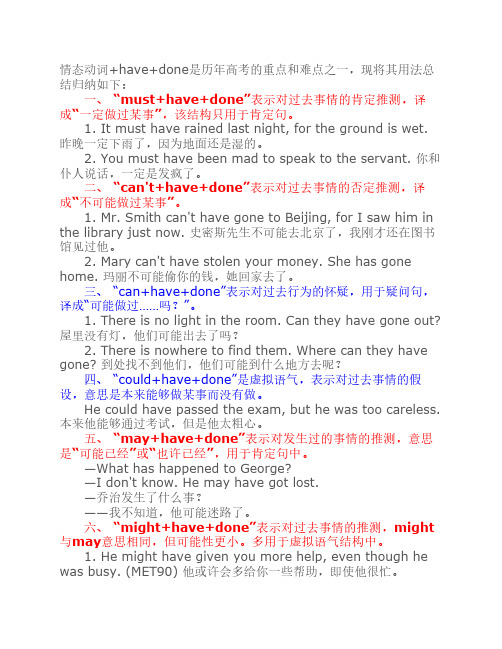
情态动词+have+done是历年高考的重点和难点之一,现将其用法总结归纳如下: 一、 “must+have+done”表示对过去事情的肯定推测,译成“一定做过某事”,该结构只用于肯定句。
1. It must have rained last night, for the ground is wet.昨晚一定下雨了,因为地面还是湿的。
2. You must have been mad to speak to the servant. 你和仆人说话,一定是发疯了。
二、 “can't+have+done”表示对过去事情的否定推测,译成“不可能做过某事”。
1. Mr. Smith can't have gone to Beijing, for I saw him in the library just now. 史密斯先生不可能去北京了,我刚才还在图书馆见过他。
2. Mary can't have stolen your money. She has gone home. 玛丽不可能偷你的钱,她回家去了。
三、 “can+have+done”表示对过去行为的怀疑,用于疑问句,译成“可能做过……吗?”。
1. There is no light in the room. Can they have gone out?屋里没有灯,他们可能出去了吗? 2. There is nowhere to find them. Where can they have gone? 到处找不到他们,他们可能到什么地方去呢? 四、 “could+have+done”是虚拟语气,表示对过去事情的假设,意思是本来能够做某事而没有做。
He could have passed the exam, but he was too careless.本来他能够通过考试,但是他太粗心。
五、 “may+have+done”表示对发生过的事情的推测,意思是“可能已经”或“也许已经”,用于肯定句中。
情态动词+have done用法一览表

A.should face B. might faceC.could have facedD.must hae faced
情态动词的其他用法
1.Cannot but+do sth.表示“不得不/只好做某事”
Have no choice but to do
“情态动词+have done”用法一览表
情态动词+have done
用法
例句
Must have done
表示对过去事实有把握的推测,具有较大的可能性。只用于肯定句中,想必/准是/一定做了
否定式can’t/couldn’t +have done
Itmust have rainedlast night, for the road is quite muddy.
would+have done
表示与过去事实相反的假设或结果。
①I would have been happy to see him, but I didn't have time.我会很高兴和他见面的,但我没时间见他。
②If your father had still been alive, he would have felt very proud of you.你父亲如果还健在的话,他会为你骄傲的。
needn’t have done
用于对过去的责备,表示”本不必做而做了”
You needn’t have taken a taxi here, for it was very near to my house.你本来不必打车来这里的,因为离我家很近。
情态动词+havedone可以有哪些用法用途
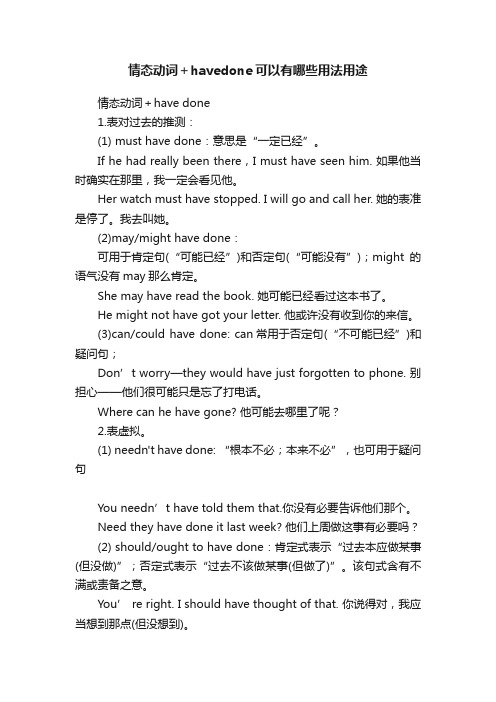
情态动词+havedone可以有哪些用法用途情态动词+have done1.表对过去的推测:(1) must have done:意思是“一定已经”。
If he had really been there,I must have seen him. 如果他当时确实在那里,我一定会看见他。
Her watch must have stopped. I will go and call her. 她的表准是停了。
我去叫她。
(2)may/might have done:可用于肯定句(“可能已经”)和否定句(“可能没有”);might的语气没有may那么肯定。
She may have read the book. 她可能已经看过这本书了。
He might not have got your letter. 他或许没有收到你的来信。
(3)can/could have done: can常用于否定句(“不可能已经”)和疑问句;Don’t worry—they would have just forgotten to phone. 别担心——他们很可能只是忘了打电话。
Where can he have gone? 他可能去哪里了呢?2.表虚拟。
(1) needn't have done: “根本不必;本来不必”,也可用于疑问句You needn’t have told them that.你没有必要告诉他们那个。
Need they have done it last week? 他们上周做这事有必要吗?(2) should/ought to have done:肯定式表示“过去本应做某事(但没做)”;否定式表示“过去不该做某事(但做了)”。
该句式含有不满或责备之意。
You’ re right. I should have thought of that. 你说得对,我应当想到那点(但没想到)。
She ought to have been more careful. 她本该更小心些。
- 1、下载文档前请自行甄别文档内容的完整性,平台不提供额外的编辑、内容补充、找答案等附加服务。
- 2、"仅部分预览"的文档,不可在线预览部分如存在完整性等问题,可反馈申请退款(可完整预览的文档不适用该条件!)。
- 3、如文档侵犯您的权益,请联系客服反馈,我们会尽快为您处理(人工客服工作时间:9:00-18:30)。
“情态动词+ have done”用法盘点
1. 表推测
must have done表示对过去发生事情的肯定推测,意为“一定,准是,想必……”,只用于肯定句中。
can / could have done表示对过去发生行为的怀疑和不肯定,通常用在否定句和疑问句中,意为“不可能……”。
may / might have done表示对过去发生的情况的推测,意为“也许,或许……”,一般只用于肯定句或否定句中,不用于疑问句。
用might则表示语气更加不肯定。
如:
It’s too late. I t hink they may have gone to bed.
太晚了,我想他们可能睡觉了。
This cake is very sweet. You must have put a lot of sugar in it.
这蛋糕很甜,你一定是放了很多糖。
My sister met him yesterday afternoon, so he couldn’t have attended your lecture.
我姐姐昨天下午遇见他了,因此他不可能去听你的课。
2. 表责备
could have done用在肯定句中,表示本来能做某事,但实际上未做某事。
might have done表示本来可能做某事,但实际上未做某事。
should / ought to have done表示本应该做某事而实际上没有做;其否定式表示某种行为不该发生但却发生了。
need have done表示过去本来有必要去做某事,但事实上没有做;其否定式表示本来不必做某事但实际上却做了。
如:
You might have given him more help, though you were busy.
尽管你很忙,但你本来可以给他更多的帮助的。
You should / ought to have stopped at the red light.
你见了红灯本应该停车的。
You needn’t have taken a taxi here, for it was very near to your house.
你没必要坐出租车,这儿离你家很近。
You could have made greater progress, but you didn’t devote yoursel f to your
study.
你本来能取得更大的成绩,但你没有全身心地投入学习。
3. 用于与过去事实相反的虚拟语气中
主要有would / should / could / might have done。
如:
If we had had enough rain last year, we could have gained a good harvest.
如果去年雨水充足的话,我们可能会有一个好收成。
If you had worked hard, you would have easily passed the final test.
如果你当时努力学习的话,就会轻松通过最后的测试的。
